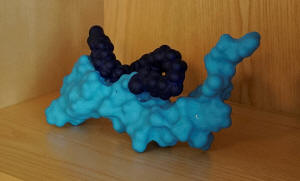More than 250 websites selling fake weight-loss drugs reported by
anti-counterfeit firm
 Send a link to a friend
Send a link to a friend
 [April 15, 2024]
By Patrick Wingrove [April 15, 2024]
By Patrick Wingrove
(Reuters) - The cybersecurity firm BrandShield has taken down more than
250 websites selling fake versions of popular weight-loss and diabetes
drugs in the GLP-1 class, the company’s CEO Yoav Keren told Reuters.
BrandShield, which shared this information exclusively with Reuters,
said that out of the 279 pharmacy websites the company closed last year
for selling drugs intended to treat metabolic conditions, more than 90%
were related to GLP-1 medicines, according to Keren.
Novo Nordisk’s Ozempic and Wegovy and Eli Lilly’s Mounjaro and Zepbound
are GLP-1 drugs, which were developed for type 2 diabetes but also
reduce food cravings and cause the stomach to empty more slowly.
The drugs have been shown to help patients lose on average as much as
20% of their weight, fueling explosive demand and a burgeoning global
market for fake versions.
Cases of harm linked to fake versions of Ozempic and other GLP-1s have
been reported in at least nine countries, including Belgium, Britain,
Switzerland and the United States.
"I wouldn't be surprised to see criminals try to use the growing
popularity of these drugs to sell more counterfeits," said Keren.
Websites taken down for selling bogus GLP-1s represented just over 15%
of the 1,655 websites BrandShield reported last year for peddling
counterfeit drugs in areas, including hormone-related drugs, central
nervous system medicines and cancer treatments.
Websites selling counterfeit GLP-1s were less common in 2022 when the
company identified 34 such sites to be closed, although it was not
targeting all of the GLP-1 drugs that year as it did in 2023, said Keren.
He said his firm last year did not find the same concentration of a
particular class of drug in any treatment category as it did for GLP-1s
as metabolic treatments.

[to top of second column]
|

Scientific model of the molecule semaglutide which is the active
ingredient in Novo Nordisk's mega-blockbuster diabetes drug Ozempic
and weight-loss drug Wegovy sits in the office of Mads Krogsgaard
Thomsen in Hellerup, Denmark, October 3, 2023. REUTERS/Ali Withers
 BrandShield worked with the
Pharmaceutical Security Institute (PSI), an industry-backed
organization, to take down these websites. PSI's members, which
include Lilly and Novo, chose which drugs to target, according to
Keren.
The CEO said his company gets these websites taken down by
collecting evidence that their products are counterfeit and
submitting that to the service providers hosting the site.
When permitted or requested by its drugmaker customers, BrandShield
will share that intelligence with law enforcement agencies. The U.S.
Food and Drug Administration said in December it was investigating
counterfeit Ozempic in the legitimate U.S. supply chain.
BrandShield also took down 3,968 listings on social media platforms
for fake drugs in all categories last year, almost 60% of which were
found on Facebook, according to a new report from the company.
The company removed more than 6,900 illegal drug listings across
social media platforms and marketplaces in total, including 992
marketplaces in India, 544 in Indonesia, 364 in China and 114 in
Brazil.
Keren said the company did not have data on how many of these social
media listings and marketplaces were selling fake versions of
GLP-1s.
(Reporting by Patrick Wingrove in New York; Editing by Caroline
Humer and Aurora Ellis)
[© 2024 Thomson Reuters. All rights reserved.]This material may not be published,
broadcast, rewritten or redistributed.
Thompson Reuters is solely responsible for this content. |